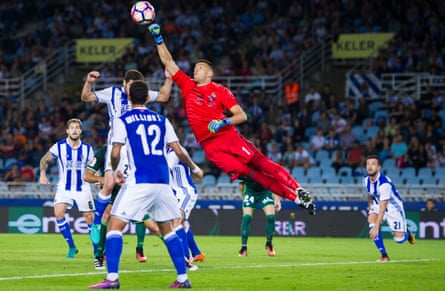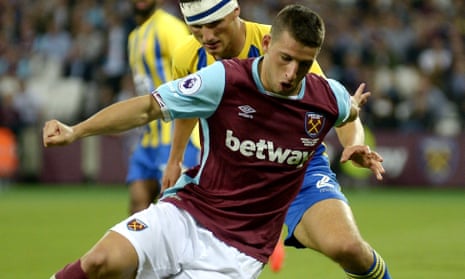Of all the millions of pounds spent this summer by Premier League clubs, the arrival of two players from an obscure club in Uruguay’s second division has not raised too many eyebrows. Seven games into the season, Jonathan Calleri and Gerónimo Rulli have appeared for a combined total of 104 minutes so far, with the goalkeeper Rulli having joined Real Sociedad on loan a few weeks after his move to Manchester City.
Look a little closer and the story becomes more complicated. Neither Calleri, who joined West Ham on loan at the start of August, nor his Argentina Under-23 colleague Rulli, made a single appearance for Maldonado, who play their matches in front of crowds of less than 300 in a ramshackle stadium located in Uruguay’s seventh most populated city.
It’s a similar story with their compatriot Hernán Toledo, who joined Fiorentina on loan in the summer, while the Brazil left-back Alex Sandro and Paraguay’s Marcelo Estigarribia are now long forgotten at the Estadio Domingo Burgueño after being sold to Porto and Juventus respectively in 2011 without having pulled on a Maldonado shirt. Since 2009, when the club was sold to unidentified foreign investors, they have spent almost £28m on players but never quite managed to win promotion in a division where average salaries are around £300 a month.
An investigation by Bloomberg in 2014 claimed the mysterious owners were none other than the English racehorse owner Malcolm Caine and the London-based lawyer Graham Shear, who became the president and vice-president respectively of a club who have been member-owned since 1928. According to the report, they bought Maldonado “as a way of easing the tax burden of investors who own player transfer rights”.
Third-party ownership (TPO) was banned in most countries by that stage, although Fifa was slow to act and did not outlaw it until December 2014. Since then, four clubs – Santos, Sevilla, the Belgian club Sint-Truidense and FC Twente – have been fined for breaching TPO rules.
That came a year after five South American clubs – Uruguay‘s Institución Atlética Sud América and Argentina’s Central Córdoba, Independiente, Racing and Rosario Central – were also fined after being found to have employed so-called “bridge transfers” which involve the sale of players from one club to another via a third club for which he never plays. No such charges have been brought against Maldonado, which “pays its players in accordance with the contractual obligations and fully accounts for and performs all tax and other statutory requirements”, according to an email sent to Bloomberg by Caine. “Our investment includes infrastructure, managerial, technical knowhow, medical and other facilities as well as player development, training and player transfers.”
There is no suggestion Fifa’s rules on third-party ownership have been breached by Maldonado.
When contacted by the Guardian, Shear, who was involved in Carlos Tevez’s move to Manchester United from West Ham in 2007, explained he no longer held a position with the club, having resigned as a director in April 2010. Bloomberg and the Argentinian newspaper La Nación alleged Jonathan Barnett – a co-founder of the Stellar Group, which is rated as one of the world’s most powerful agencies – was also connected to the club, but Shear denied that is the case.
When contacted by the Guardian, Barnett – who co-owns several horses with Caine, including one called Curbyourenthusiasm – denied any involvement with Maldonado. Caine, who remains the owner of the club having signed a 15-year agreement in 2009, is said to have lost money since investing, having built a training ground and established a youth team. Pictures taken during last week’s 3-1 win over CA Villa Teresa showed a dilapidated stadium with concrete steps for seating and a handful of supporters dotted around the stands.
“We have confusing information concerning Deportivo Maldonado,” said Pippo Russo, a sociologist from Florence University who has investigated third-party ownership in South America and beyond.
“There have been a lot of articles about them but they often have different points of view concerning the ownership of the club.”
In Uruguay, legislation means investors can save up to 40% in tax costs compared with Argentina or Brazil. Therefore players are able to sign a deal with a lower league club such as Maldonado and then be loaned out to a larger side involved in the Copa Libertadores in the hope they will be scouted by a big club in Europe. In 2013, in an effort to stop the practice, the Uruguayan football association increased the tax rate on player trades to 12.5% from 4%, although investors don’t pay capital gains tax if they route income offshore through a Uruguayan company compared to facing 35% percent rate in Argentina.
“It is the biggest fiscal tax haven in the continent and this has consequences for football,” Russo said. “There are a lot of Argentinian agents and businessman who have become owners of clubs in Uruguay, and Chile as well.
“In the general framework of South American football, clubs are owned and managed to bypass the rules of third-party ownership. This was the general trend I forecasted when the rules were introduced by Fifa. Deportivo Maldonado was a pioneer in arranging this sort of business.”
This is not the first time there have been claims Barnett and Stellar Group may have indulged in schemes to get around third-party ownership. The Dutch national broadcaster NOS ran a story in July that detailed the cases of four young players whose parents have been employed by Stellar as agents in exchange for their sons’ signatures.
A court case brought by Stellar in February revealed the father of the Feyenoord youth product Kyle Ebecilio, who is back in his homeland with FC Twente after joining Arsenal in 2010, was made the sole director of a company called Quick Star Limited a few days after his son’s 16th birthday, with a loan of £40,000 paid into the company’s account by his new agents.
Similar companies exist for Manchester United’s Timothy Fosu-Mensah (Mensah Services Limited) and Manchester City’s Javairo Dilrosun (Dilroson Goals Limited) and Rodney Kongolo (Avon Vale Limited). Dilrosun and Kongolo were 15 at the time the companies were established. Although the establishment of the companies is permitted, Fifa rules state it is illegal for players to sign a contract with any agent until they turn 16. Again, there is no suggestion of rules having been breached. Stellar say it is still yet to be repaid the loan by Ebecilio’s father.
Barnett has also categorically denied any involvement with either Calleri or Rulli’s moves to England. Signed by Boca Juniors at the start of 2014 from the second division side All Boys, was purchased by Maldonado for €12m in January 2016 despite interest from several European clubs, including Brighton and Internazionale. After his move to Maldonado, Calleri was almost immediately loaned out to São Paulo in the Campeonato Brasileiro, in which he scored nine goals in 12 games as São Paulo reached the semi-finals of the Libertadores. When asked by a fan on his last day of training where he was heading next, Calleri said: “I wish I knew.”
According to La Nación, Calleri was brought to Maldonado’s attention by Gustavo Arribas, who was employed as an adviser to the club until December last year and is now the head of Argentina’s Federal Intelligence Agency.
West Ham are understood to have paid a £4m fee to secure Calleri on a season-long loan, with an option to buy him for around £16m when that expires. The club insist there is no obligation to buy and they have not broken any rules.
“Everything has been sanctioned by Fifa and there is no question of any third-party ownership,” a spokesman said.
Rulli’s situation is even more complicated. He broke into the first team at Estudiantes and was bought by Maldonado in 2014. Having spent last season on loan at Real Sociedad, the 24-year-old signed for City on 18 July in a permanent deal worth around £4m. Less than three weeks later, Sociedad announced on their website that Rulli had joined on a permanent deal until 2022, although the move will not be completed until January. City are thought to have a buyback clause that enables them to repurchase him for £11.6m (€14m) in each of the next three summer transfer windows.

“The deal was done directly with Maldonado,” a City spokesman said. “There is no question of his economic rights being held by a third party.
“This one is all completely above board. There have been times in the past when we have taken players out of third-party ownership but this genuinely isn’t one. You’ll find it in some places but you won’t find it here.
“I’m told that there is history with them (Maldonado) and third party owners but on this one we’re confident that it isn’t the case.”
Confused? You are not the only ones. One of the main controversies stemming from the Daily Telegraph’s sting on the former England manager Sam Allardyce centred on his comment about how easy it remains to circumvent Fifa’s rules on TPO, having claimed to have achieved exactly that when West Ham signed Enner Valencia from the Mexican side Pachuca. The West Ham co-owner, David Sullivan, denied that was the case last week, stating Pachuca owned all of the Ecuadorian’s economic rights when they bought him.
“Sam is wrong but he didn’t know much about the actual transfer deal other than wanting the player,” Sullivan said. “We have not broken any rules on third party ownership.”
Russo said Fifa must close the loophole if they are serious about banning the practice which Michel Platini once branded “a type of slavery”.
“I think that nothing has really changed. In my opinion, this is the same as the battle against doping,” he said. “When the authorities ban a substance, the scientists are two or three steps ahead. The same applies in third-party ownership: when Fifa introduces a new rule against this practice, the investors are always two or three steps in advance.”
